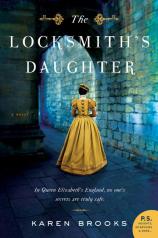Reading Group Guide
Discussion Questions
The Locksmith's Daughter

1. When Angela tells Mallory to ignore the man who bullies her, Mallory responds, “A coward and a bully he may be, but there’s many would argue my actions created him --- Mamma among them.” Why does Mallory believe this? Is it a fair assessment?
2. Mallory has a radically different relationship with her father the locksmith than with her mother. Why is that? Does your view of either relationship change as the story unfolds?
3. Mallory speaks several languages, knows mathematics and can pick any lock. She is unique in an age when women of her class were rarely educated or taught a trade. But in what other ways does Mallory defy traditional gender roles of the time? Are there instances when she does conform to what’s expected of a woman?
4. “Uncommonly tall, slender as a willow stick but with olive-toned skin and jet-black hair, I was most often described as ungainly and teased as a spawn of a blackamoor or a Romany.” Mallory’s mother uses lemon juice and cosmetics to lighten her daughter’s hair and skin. What does this say about 16th-century beauty standards? Are they similar or different from those of the 21st century?
5. From Mamma remaining a faithful Catholic until the end of her life to Sir Francis’ unwavering allegiance to Queen Elizabeth, loyalty drives many characters in the novel. How does their loyalty to various causes --- and each other --- impact the characters’ lives, for better or for worse?
6. After witnessing the grisly torture and execution of Catholic priests at Tyburn, Mallory says: “It was even easier to commit atrocities when they were enacted in the name of justice; when you believed you were working for the good of the realm, for the security of the sovereign and your people. It was easy when you didn’t see the consequences and others performed the retribution for you. It was easy to be ruthless when you ceased to think of those convicted as human, and saw them as enemies. In that way, anything --- any kind of action --- could be justified.” What other examples of this do we see in history? Or in our present time?
7. How does what Mallory sees at Tyburn change her view of her work for Sir Francis? Is it a turning point for her?
8. Nathaniel says to Mallory: “You are not a fallen woman, Mallory, so much as one who was pushed.” What does he mean by that? Do you agree? How do you view Mallory’s relationship with Raffe and its fallout?
9. What do you make of the complicated relationship between the locksmith and Sir Francis?
10. Why does Sir Francis leave his book containing his life’s work to Mallory? Does the book “change everything,” as Nathaniel promised?
11. What do you think becomes of Mallory and her family 10 years following the end of the novel? Do you think she’s using Sir Francis’s book in the way that he intended her to use it?
The Locksmith's Daughter
- Publication Date: July 31, 2018
- Genres: Fiction, Historical Fiction
- Paperback: 576 pages
- Publisher: William Morrow Paperbacks
- ISBN-10: 0062686577
- ISBN-13: 9780062686572







